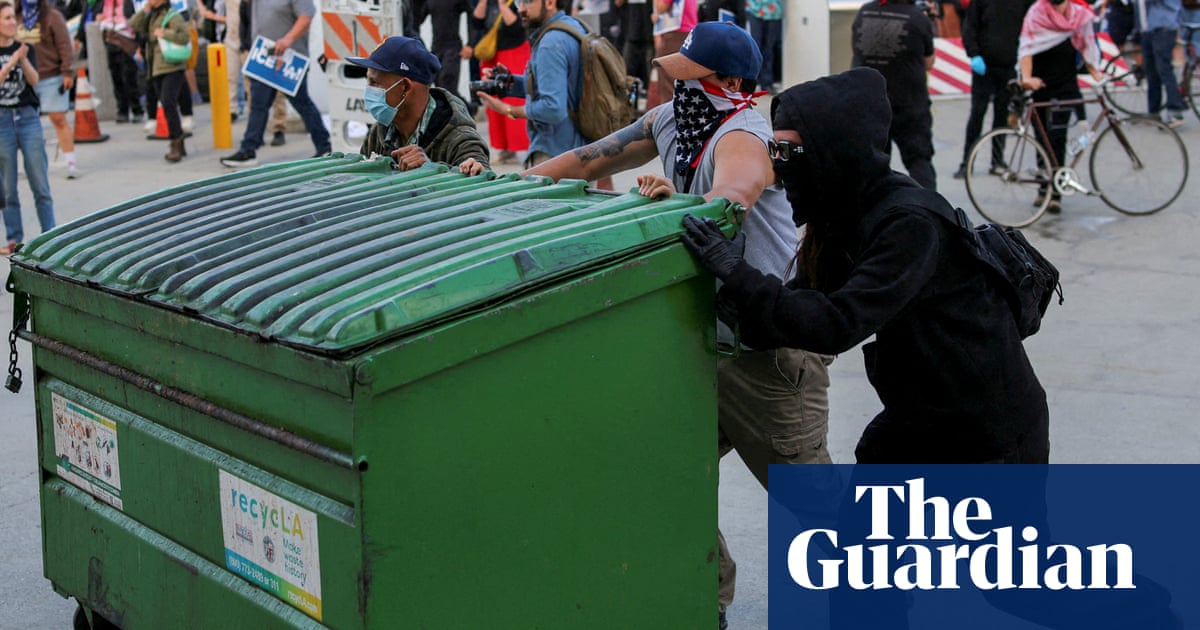Uline, a Wisconsin-based office supply company owned by one of Donald Trump’s biggest financial backers, paid workers it brought from Mexico to work at its US warehouses just a fraction of what their US counterparts were paid, according to four sources who spoke to the Guardian.
The workers from Mexico earned per day about the same as their US counterparts were paid by the hour, according to the American and Mexican sources, who spoke on condition of anonymity because of nervousness about speaking out publicly against the company. One pay stub, which was seen by the Guardian, showed that a Mexican worker was paid about $38 per day, plus a weekly bonus of about $225 before taxes. Separately, they were also paid daily food expenses.
In comparison, a former warehouse worker, who is American, said based on his experience, Uline’s American warehouse staff were earning between $30 to $35 per hour when he left the company in 2023. The American workers also received health insurance and 401k benefits.
Most Uline warehouse positions in Wisconsin and Pennsylvania currently pay between $25 and $35 per hour, with some offering as much as $38 per hour, according to postings on the job listing website Indeed.com.
The new revelations follow a story the Guardian published in December, about a so-called “shuttle program” at the company, which Uline used to bring workers from its warehouses in Mexico to its warehouses in the US, especially Wisconsin and Pennsylvania.
The Mexican workers traveled to the US using tourist visas and visas meant for employees who are entering the US temporarily to receive professional training, known as B1 visas, and not for regular work. Sources with direct knowledge of the matter alleged the Mexican employees stayed for one to six months and performed normal work at the company.
Uline, the shipping supply magnate that made $8bn in revenue in 2024, has 13 distribution centers and employs more than 9,000 people across the US, Mexico and Canada. The company’s founders are Dick and Liz Uihlein. Dick Uihlein has established himself as a billionaire mega-donor, giving tens of millions to rightwing candidates and political causes. Liz Uihlein is also a conservative donor. Federal Election Commission reports show they collectively gave $130m in support of Donald Trump during the 2024 election cycle. One television advertisement funded by Dick Uihlein’s Super Pac, Restoration Pac, during the 2024 presidential election attacked then Democratic vice-president Kamala Harris for allowing an immigrant “invasion” at the US-Mexico border.
Uline has declined to respond to the Guardian’s questions about its shuttle program. It is unclear whether the program is still in place or has been discontinued.
Since the Guardian’s December publication of that story, additional sources have come forward to talk about their own experience at the company.
One person who had participated in the shuttle program told the Guardian that employees at Uline’s Mexico facilities were encouraged to enroll in the program amid US workforce shortages during the pandemic. The source, who declined to be named due to concerns about retaliation by the company, said he had traveled to the US on a tourist visa.
Uline “sold” Mexican employees on the promise of independence, leisure travel and weekly bonuses if they participated, he said.
But the terms of the arrangement were stressful, he said: employees understood they would be traveling to work in US warehouses, but they were instructed to tell immigration officials they were traveling strictly for training purposes and were given paperwork from Uline claiming the same.
In reality, “we did the same work we do here in [Mexico],” he said. “You knew you were going to work, they even told you that – but they told us to say that we were training so that we didn’t get in trouble.”
Making the trip from Mexico to the US could be stressful for those workers who understood that they were entering the US misrepresenting the nature of their travel, sources told the Guardian. There were also incidents when, they said, border officials seemed suspicious of the travel and stopped them for questioning, though the sources who spoke to the Guardian said there were no major incidents.
“I was a little worried,” the person said, “they were detaining them in the airport, and asking a lot of questions.”
Two other former Uline workers, who are non-Hispanic Americans and also asked not to be named, described other aspects of working for the company that made them uncomfortable. Both alleged that the company relied not only on full-time staff from both the US and Mexico, but also on a significant number of temporary workers who were contracted through an agency in Wisconsin. The former Uline workers alleged in independent accounts that these temporary workers were exposed to frigid and sometimes freezing temperatures in the warehouse without being allowed to wear jackets, hats or gloves.
Uline’s permanent warehouse workers, one former employee said, had to wear a uniform of a red Uline polo, blue zip up jacket, blue work pants, and single color shoes. In the winter, the permanent staff could wear a fleece and a thin hat, but not a thicker coat.
The temporary contracted staff, who were mostly Hispanic, were given only a vest that said Uline.
“They weren’t allowed to wear hats or gloves of any kind, because the manager said it broke code. There were times, in winter in Wisconsin, when it’s single digits at night,” the person said. “And if they got caught wearing them, they were told to take them off. If they were caught a second time, they were told to go home and then wouldn’t come back.”
The person added: “They did not treat them like human beings.”
The person, who worked for Uline for about four years, recalled that one night when it was “absolutely frigid” – about -6F – he and a co-worker grabbed some extra fleece jackets that were on a table designated for Uline staff and brought them to the temporary contracted workers, only to be “screamed at” by a manager.
“I told him I didn’t care and to write me up because it was -6. It didn’t even make sense. It is unethical,” the person said.
Another former worker independently corroborated the account, saying he had worked at multiple warehouse sites, but that no workers were treated as badly as temporary workers at Uline.
“Worse than any job I have ever seen in my life,” he said. There were frequent injuries related to the cold, he added.
“You would see their hands, they could barely move their fingers and they had to work through it. They couldn’t just stop and take a break,” he said. Workers, he added, were easily replaceable, especially for temporary staff.
“There was a temp who had his foot run over, he couldn’t tell management. He worked through it because he had a family to feed,” he said.
Uline did not respond to questions about the former workers’ claims about the treatment of temporary workers.
-
Do you have a tip on this story? Please email: [email protected]

 3 months ago
69
3 months ago
69

















































